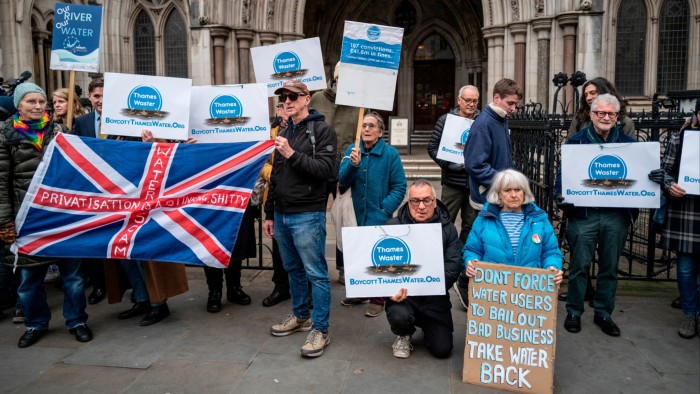Unlock the Editor’s Digest for free
Roula Khalaf, Editor of the FT, selects her favourite stories in this weekly newsletter.
Thames Water faces a fresh courtroom challenge to its efforts to raise an emergency loan worth up to £3bn, with environmental campaigners pressing the case that it makes more sense for the debt-laden utility to be temporarily renationalised.
Campaign group Windrush against Sewage Pollution plans to present its case at a hearing in February in which a High Court judge will decide whether to approve the £3bn creditor loan that would buy Thames Water time to restructure its existing £19bn debt and raise new equity.
The loan from a group of existing class A creditors, which includes hedge funds such as Elliott Management, comes with a 9.75 per cent interest rate as well as additional fees and incentives for Thames Water’s management.
Failure to secure the loan would be likely to result in Britain’s largest water utility being temporary renationalised by being placed in the government’s special administration regime. Thames Water currently has enough cash to last until the end of March.
Ashley Smith, of the Windrush against Sewage campaign, accused the creditors of “pursuing a self-interested loan that will make them richer and us poorer and do nothing to protect essential water supplies or end illegal sewage pollution”.
The utility’s “16mn consumers should be given a say after 35 years of being ripped off by monopolistic water companies”, he added.
The environmental group wrote to the High Court before the last hearing in December, and has secured solicitors and counsel to prepare its case. It has been told that it will be allowed to make a submission and that the court will “determine its standing in the proceedings”.
The deal is already being challenged in court by a different group of class B creditors, who are offering a cheaper deal. The class Bs argue that if their arrangement is not approved, they would be better off under the special administration regime.
If the government or Thames Water were to call for special administration, then an intermediary, usually a licensed insolvency practitioner, would take over the running of the company.
This would relieve the business from paying interest on the debt, freeing up cash to be spent on maintenance and improvements and enabling time for the business to be restructured. There would be no need for the government to take on the debt as it would essentially be frozen, experts say.
The special administrator could then impose a “haircut” or loss on the creditors to bring the debt down to more acceptable levels. Hedge funds such as Elliott that have taken on debt in recent months will be betting on the size of the haircut and make a profit if they have got it right. The administrator would then seek new investors and potentially a listing, a break-up of the group or its renationalisation.
Sir Dieter Helm, professor of economic policy at Oxford university, said the special administration regime was preferable as it would enable Thames Water to focus on a restructuring and on delivering improvements, rather than on negotiating a deal with creditors.
Thames Water said its plan was the “only viable solution” and “delivers for customers and stakeholders”.
A spokesman for the class A creditors said: “Our focus is on delivering a highly complex operational turnaround and restructuring of Thames Water which aims to prevent a special administration and save UK taxpayers bearing billions in increased costs.”
Read the full article here

